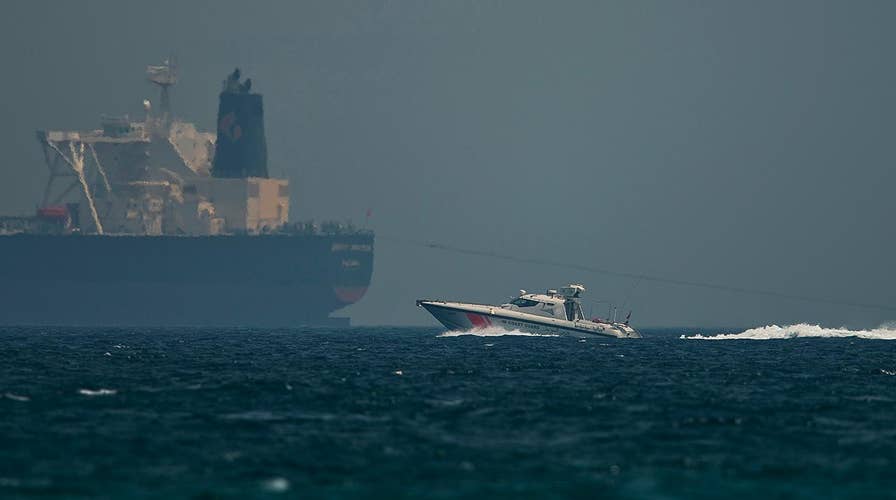Saudi government say armed drones struck an oil pipeline, causing a fire and minor damage
Claim comes hours after initial American assessment points to Iran for sabotaging oil tankers off the coast of the United Arab Emirates; Rich Edson reports from the State Department.
Saudi Arabia said Tuesday it stopped pumping on a major oil pipeline after it was hit by a coordinated drone attack by Iran-allied Yemen Houthi rebels.
The attack, confirmed by the Saudi energy minister, follows recent reports of sabotage against oil tankers in the Persian Gulf off the coast of the United Arab Emirates.
GROUP ACCUSES YEMEN REBELS OF STORING WEAPONS NEAR CIVILIANS
Energy Minister Khalid al-Falih Al-Falih, who called the pipeline attack “cowardly,” vowed that production and export of Saudi oil would not be interrupted; however, the news sent U.S. oil prices up 1.4%.
Al-Falih added that recent acts of sabotage against Saudi installations were not only hurting the country but also putting the world’s energy supply and global economy at risk.
Yemen's Houthi rebels said they launched seven drones against vital installations in Saudi Arabia, which borders Yemen to the north. Saudi Arabia has been at war with the Houthis and their allies in Yemen since March 2015, targeting the Iranian-allied rebels with near daily airstrikes.
"This is a message to Saudi Arabia: Stop your aggression," Houthi spokesman Mohammed Abdel-Salam told The Associated Press. "Our goal is to respond to the crimes they are committing every day against the Yemeni people."
IRANIAN PRESIDENTIAL AIDE SAYS TRUMP WILL 'GET A WAR' FOR LISTENING TO 'THE MUSTACHE' JOHN BOLTON

This satellite image provided by Maxar Technologies shows the Saudi-flagged oil tanker Amjad off the coast of Fujairah, United Arab Emirates, Monday, May 13, 2019. As many as four oil tankers anchored in the Mideast were damaged in what Gulf officials described Monday as a "sabotage" attack off the coast of the United Arab Emirates. (Satellite image ©2019 Maxar Technologies via AP)
SAUDI ARABIA EXECUTES 37 PEOPLE ON TERRORISM ALLEGTIONS: REPORT
The two oil pumping stations targeted in Saudi Arabia are over 500 miles from Yemen's northern border with the kingdom. It wasn't immediately known where the Houthis launched the drones.
The attacks demonstrated the increased risks in a region vital to global energy supplies amid heightened tensions following the Trump administration's withdrawal from the 2015 nuclear deal between Iran and world powers, and the subsequent reimposition of U.S. sanctions to cripple the Iranian economy.
Iran has since said it would begin enriching uranium at higher levels by July 7 if world powers failed to negotiate new terms for the deal.
Al-Falih said the drone attacks reaffirm the need of the international community to confront the activities of groups like the Houthis, whom he accused of being backed by Iran, Saudi Arabia's regional rival.
He said the drones had targeted petroleum pumping stations supplying a pipeline running from its oil-rich Eastern Province to the Yanbu Port on the Red Sea.
NORTHERN RED SEA CORAL REEFS MAY SURVIVE A HOT, GRIM FUTURE
Saudi Aramco, the government-controlled oil company, said it temporarily shut down the East-West Pipeline and contained the fire, which caused minor damage to one pumping station as a precaution. It added that Saudi Aramco's oil and gas supplies have not been affected by the attack.
Saudi Arabia said the two petroleum pumping stations that were struck by drones are located in the greater region of Riyadh. The stations, targeted around the same time early Tuesday, are located in al-Duadmi and Afif, about 125 miles west of Riyadh city and 250 miles west of Riyadh city, respectively.
CLICK HERE FOR THE FOX NEWS APP
Saudi Arabia built its pipeline in the 1980s amid fears that the Iran-Iraq war would cut off shipping traffic through the Strait of Hormuz. The 746-mile pipeline is actually two pipes that have a total capacity of 4.8 million barrels of crude oil a day, according to the U.S. Energy Information Administration.
The four oil tankers that were targeted Sunday off the coast of the UAE's port of Fujairah were allegedly damaged in what Gulf officials described as sabotage, although satellite images obtained Tuesday by the AP showed no visible damage to the vessels.
The Associated Press contributed to this report.









































